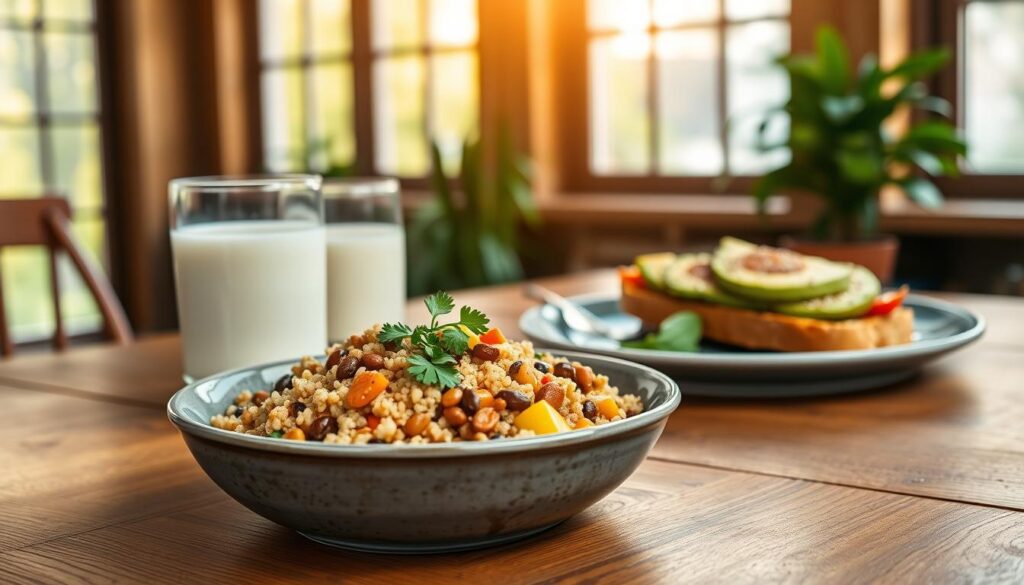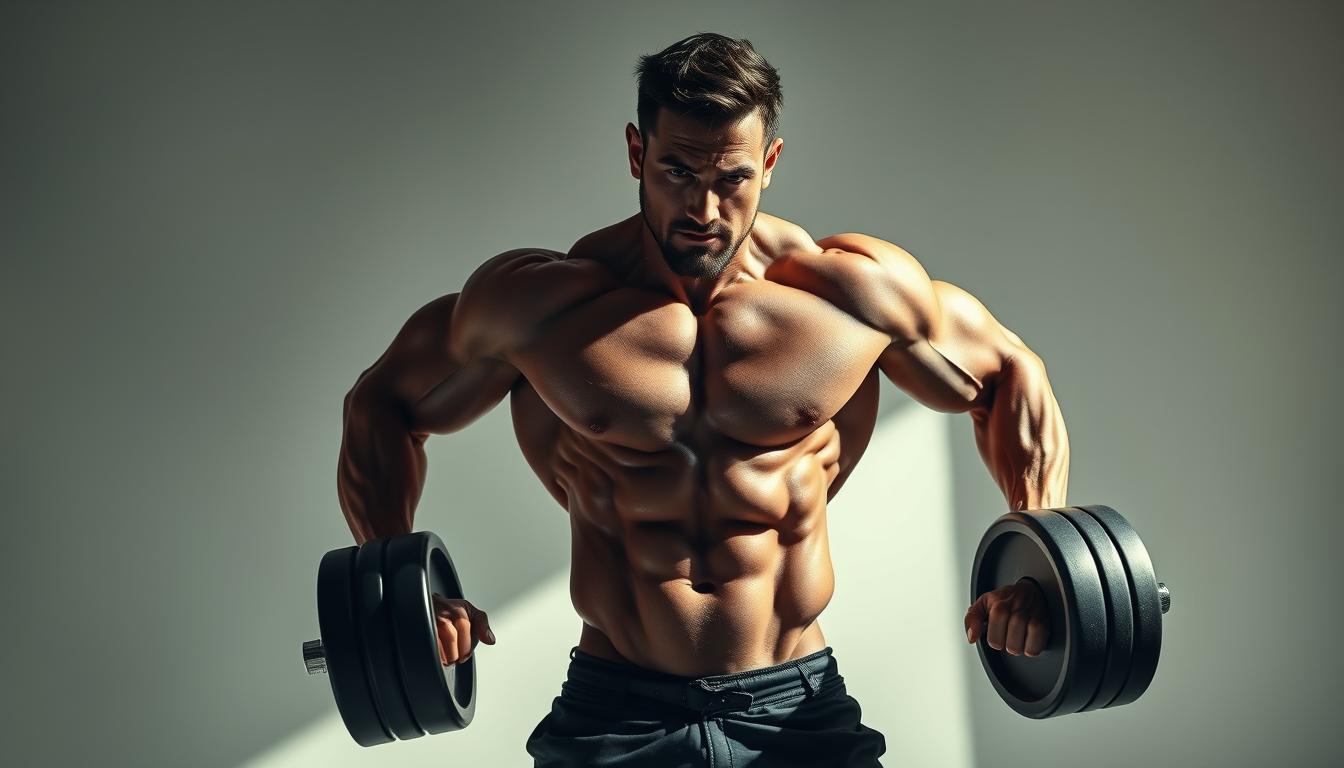A well-planned plant-based diet can be incredibly effective for building lean muscle. Did you know that some of the world’s top athletes thrive on a vegan diet, achieving impressive muscle gains without consuming animal products?
Nutrition plays a critical role in muscle development. Consuming the right balance of protein, complex carbohydrates, and healthy fats supports muscle growth and recovery. A variety of plant-based muscle building recipes can provide the necessary nutrients for lean muscle gain.
Key Takeaways
- Importance of a well-planned vegan diet for muscle gain
- Role of nutrition in muscle development
- Balancing protein, carbohydrates, and healthy fats
- Variety of plant-based recipes for muscle building
- Nutritional support for muscle recovery
- Effective vegan meal planning for lean muscle gain
The Science Behind Vegan Muscle Building
Vegan muscle building is rooted in the principles of nutritional adequacy and caloric surplus. Understanding the nutritional foundation is crucial for effective muscle gain on a vegan diet.
Protein Requirements for Muscle Growth
Protein is a critical nutrient for muscle growth, providing the necessary building blocks for muscle repair and development. Vegan individuals require adequate protein intake, which can be achieved through consumption of high-protein foods such as legumes, beans, and tofu. The recommended daily intake varies based on factors like activity level and specific fitness goals.
15g
| Food | Protein Content per Serving |
|---|---|
| Black Beans | |
| Tofu | 20g |
| Lentils | 18g |
Essential Nutrients Beyond Protein
Beyond protein, other nutrients play vital roles in muscle function and recovery. These include creatine, iron, and branched-chain amino acids (BCAAs). Vegans must ensure adequate intake of these nutrients through diet or supplementation to support muscle health.

Caloric Surplus: The Foundation of Muscle Gain
A caloric surplus is fundamental for muscle gain, as it provides the energy necessary for muscle growth. Vegan individuals aiming to build muscle must consume more calories than they burn, focusing on nutrient-dense foods to support their fitness goals.
By understanding and implementing these nutritional principles, individuals can effectively support their muscle-building goals on a vegan diet.
Key Vegan Protein Sources for Muscle Development
Protein is a critical nutrient for muscle growth, and vegans have numerous options to meet their needs. A muscle-building vegan diet focuses on high-protein foods that support muscle development and overall health. Incorporating a variety of these protein sources into your diet is essential for achieving your muscle gain goals.
Legumes and Beans
Legumes and beans are fundamental to a vegan diet, offering a rich source of protein and fiber. Examples include lentils, chickpeas, and black beans. These foods are versatile and can be incorporated into a range of dishes, from soups to salads. They provide a significant amount of protein per serving, making them ideal for muscle development.
- Lentils: 18g of protein per 1 cup cooked
- Chickpeas: 15g of protein per 1 cup cooked
- Black Beans: 15g of protein per 1 cup cooked
Tofu, Tempeh, and Seitan
Tofu, tempeh, and seitan are soy-based products that are high in protein and can be easily integrated into meals. Tofu is a great source of protein and can be used in a variety of dishes, from stir-fries to scrambles. Tempeh and seitan offer additional protein and texture options, making them valuable for a muscle-building diet.
Plant-Based Protein Powders
For convenience and efficiency, plant-based protein powders are a valuable supplement. Options include pea, hemp, and brown rice protein powders. These can be easily added to smoothies or post-workout shakes to boost protein intake. They offer a concentrated dose of protein, supporting muscle recovery and growth.
Nuts, Seeds, and Whole Grains
Nuts and seeds, such as almonds and chia seeds, provide additional protein and healthy fats. Whole grains like quinoa and farro are also high in protein and fiber. Incorporating these into your diet adds variety and ensures a broad intake of essential nutrients. Quinoa is a complete protein, making it particularly valuable for muscle development.
Easy Vegan Meals for Lean Muscle Gain: 7-Day Meal Plan
To support lean muscle gain, vegans need to focus on protein-rich meals and consistent meal timing. A well-planned 7-day meal plan is essential for ensuring that the body receives the necessary nutrients for muscle development.
How to Prepare Protein-Packed Vegan Breakfasts
Starting the day with a protein-rich breakfast is crucial for muscle gain. Two simple and nutritious options include:
Tofu Scramble Bowl Recipe
Prepare a tofu scramble with spinach, bell peppers, and turmeric, served with whole-grain toast or a wrap. This meal is not only high in protein but also rich in vitamins and minerals.
Protein Oatmeal Recipe
Mix rolled oats with plant-based milk, protein powder, and nuts, then top with fresh fruit. This breakfast is both filling and packed with protein to support muscle gain.
Nutrient-Dense Lunch Recipes
For lunch, focus on meals that combine protein with complex carbohydrates and healthy fats. Two effective recipes are:
Lentil Power Bowl Recipe
Cook lentils with vegetables and spices, served over quinoa or brown rice. Lentils are a great source of protein and fiber.
High-Protein Wrap Recipe
Fill a whole-grain wrap with tempeh, avocado, lettuce, and tomato. This meal is not only protein-rich but also provides healthy fats for recovery.
Muscle-Building Dinner Ideas
Dinner should be substantial and include a balance of protein, complex carbohydrates, and vegetables. Consider:
Tempeh Stir-Fry Recipe
Stir-fry tempeh with a variety of colorful vegetables and serve over brown rice or quinoa. Tempeh is a fermented soybean product high in protein.
Bean and Quinoa Chili Recipe
Cook a hearty chili with beans, quinoa, and a mix of vegetables. This dish is rich in protein, fiber, and complex carbohydrates.
Strategic Snacks for Continuous Protein Intake
Snacking is crucial for maintaining a positive nitrogen balance and supporting muscle growth. Opt for snacks like nuts, seeds, fruit with nut butter, or protein smoothies made with plant-based protein powder.
By incorporating these meal ideas into a 7-day meal plan, vegans can ensure they are consuming the necessary protein and nutrients to support lean muscle gain.
Quick Meal Prep Strategies for Busy Athletes
Vegan athletes need practical meal prep strategies to achieve their muscle-building goals. With demanding training schedules, it’s challenging to maintain a consistent vegan muscle gain nutrition plan. Effective meal preparation is key to ensuring that nutritional needs are met without compromising on time.
To start, identify your nutritional requirements and plan meals accordingly. This involves calculating your daily protein needs, caloric intake, and essential micronutrients. Having a clear understanding of your nutritional goals helps in creating a focused meal prep plan.
Step-by-Step Batch Cooking Guide
Batch cooking is a time-efficient method for preparing meals in advance. Start by selecting a few recipes that can be made in bulk, such as lentil stews or quinoa salads. Cook in large quantities, portion into individual servings, and store in airtight containers for up to 3-4 days.
Essential Time-Saving Kitchen Tools and Techniques
Investing in the right kitchen tools can significantly reduce meal prep time. Essential tools include a slow cooker, instant pot, and food processor. Techniques such as prep-ahead chopping and one-pot cooking also streamline the cooking process.
Storage and Reheating for Maximum Nutrient Retention
Proper storage and reheating techniques are crucial for maintaining the nutritional value of prepped meals. Use airtight containers to store meals and reheat using methods that preserve nutrients, such as steaming or microwaving with a damp cloth to prevent moisture loss.
5 Ready-in-15-Minutes Muscle Building Meals
For days when time is scarce, having quick meal options is vital. Five muscle-building meals that can be prepared in under 15 minutes include: pre-cooked lentil and vegetable stir-fry, avocado toast with chickpeas, smoothie bowls with protein powder, overnight oats, and quinoa and black bean salad.
Common Mistakes to Avoid in Vegan Muscle Building
Building lean muscle on a vegan diet requires careful planning to avoid common pitfalls. A well-structured diet and training regimen can help you achieve your goals, but neglecting certain aspects can hinder your progress.
Insufficient Protein Intake: Signs and Solutions
One of the most significant mistakes in vegan muscle building is inadequate protein intake. Protein is essential for muscle repair and growth. Signs of insufficient protein intake include fatigue, slow recovery, and loss of muscle mass. To avoid this, ensure you’re consuming enough protein-rich foods like legumes, tofu, and plant-based protein powders.
A general guideline is to consume 1.2-1.6 grams of protein per kilogram of body weight daily. For example, if you weigh 70 kg, aim for 84-112 grams of protein per day.
Overlooking Essential Micronutrients
Another critical mistake is overlooking essential micronutrients like vitamin B12, iron, and omega-3 fatty acids. These nutrients play a crucial role in energy production, muscle function, and overall health. Include a variety of whole foods in your diet, such as nuts, seeds, and whole grains, to ensure you’re getting these essential micronutrients.
Improper Meal Timing and Frequency
Meal timing and frequency are also vital for muscle building. Skipping meals or going too long without eating can lead to muscle loss and decreased performance. Aim to eat 4-6 meals per day, spaced out every 3-4 hours, to keep your muscles fueled and support growth.
Relying Too Heavily on Processed Vegan Foods
While convenient, relying too heavily on processed vegan foods can be detrimental to your muscle-building goals. These foods are often high in empty calories, added sugars, and unhealthy fats. Focus on whole, nutrient-dense foods like vegetables, fruits, and whole grains to provide the necessary fuel for muscle growth.
| Common Mistake | Signs | Solutions |
|---|---|---|
| Insufficient Protein Intake | Fatigue, slow recovery, loss of muscle mass | Consume 1.2-1.6 grams of protein per kilogram of body weight daily |
| Overlooking Essential Micronutrients | Fatigue, decreased performance, poor overall health | Include a variety of whole foods in your diet |
| Improper Meal Timing and Frequency | Muscle loss, decreased performance | Eat 4-6 meals per day, spaced out every 3-4 hours |
| Relying Too Heavily on Processed Vegan Foods | Consuming empty calories, added sugars, and unhealthy fats | Focus on whole, nutrient-dense foods |
Conclusion
A well-planned vegan diet is crucial for achieving lean muscle gain. By incorporating high-protein vegan meals and adopting vegan bodybuilding meal prep strategies, individuals can support their muscle-building goals. The key is to focus on nutrient-dense foods and balanced meal planning.
To maximize muscle growth, it’s essential to consume sufficient protein from sources like legumes, tofu, and plant-based protein powders. Additionally, a caloric surplus is necessary to support muscle development. By understanding the importance of meal timing and frequency, individuals can optimize their vegan bodybuilding meal prep.
By applying the knowledge gained from this article, readers can create effective high-protein vegan meals that support their fitness journey. A well-structured meal plan, combined with consistent training, will help individuals achieve their lean muscle gain goals.
